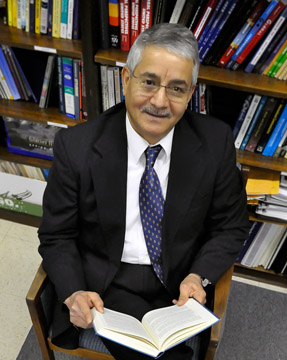Purdue Profiles: Yahya Kamalipour
October 16, 2012
 |
|
Yahya
Kamalipour, professor of mass and internal communication and head of the Department
of Communication and Creative Arts at Purdue Calumet, founded the campus'
Center for Global Studies in 2006. (Photo provided) |
Yahya Kamalipour is fascinated with the effects that media -- from advertising billboards to television programs to social websites -- have on modern culture.
As professor of mass and internal communication and head of the Department of Communication and Creative Arts at Purdue Calumet, Kamalipour spends ample time studying the media and its influence on everyday life. Born in a small village in Iran before migrating to the U.S. in 1972, Kamalipour also is director of the Center for Global Studies, which is housed on the Calumet campus.
When did you start the Center for Global Studies and why?
I began the center in 2006 based on the notion that, nowadays, we live in a globalized world, and that we should all be aware of the world's cultures and issues. In order to function better, we should have a good understanding of various ethnicities, governments and international communications, and of the influence of media on our daily lives. Keeping that in mind, the center normally organizes one event each semester related to a timely topic. The center operates as a standalone unit; it has a very small budget and it’s essentially a solo operation by me with some help from a few other interested Purdue Calumet faculty members.
In a previous semester, we brought in representatives of the world's five major religions together and had a wonderful dialogue with them. That event attracted more than 200 people from the campus and the surrounding community, and the media gave it good coverage. As another example of a previous event, for the first time in the history of Northwest Indiana, we brought together all CEOs of the major local media companies who talked about the media’s impact on the region economically, socially and otherwise.
What are some major topics you plan to ask the center's upcoming speakers to address?
In general, we try to explore contemporary and media-related issues, as well as issues related to education and globalization. Certainly the ongoing conflict in the Middle East is a hot topic. So is the role of media in either contributing to those conflicts or trying to resolve some of those conflicts through dialogue and honest, fair, realistic reporting. Too many times, the media tend to box themselves into a particular mode of thinking on this and other topics. For example, oftentimes, issues that are really meaningful and that contribute to a productive dialogue often don't come up in interviews with foreign leaders.
Organizing events that delve into these issues and enhancing understanding is on my agenda. For instance, we've invited a speaker who is an author from Chicago to come give a presentation about her book and her experience in Afghanistan. As always, the center's events are open to everyone and are free of charge, because I believe that global awareness and cultural awareness should not be confined to universities. Community members also should benefit and be engaged in such dialogues.
As a communication professor, how do you get you students to think outside of the box you described?
I teach my students that it's vital for them to do research and understand the global and communication issues and problems, whether it's in an academic context or as future members of the media. I teach them that it's also important for them to ask questions that will advance a meaningful dialogue and enhance their understanding of issues at hand. Going into the media market and conducting an interview, they need to have a clearly defined purpose for the conversation.
These teachings are not just confined to my classrooms. I also focus on them in my published books, especially the global communication textbook which is used all across the U.S. and in China, and I incorporate them into my work as the founder and editor of the Global Media Journal, with 18 established editions in 18 countries.
How have your personal experiences influenced your career?
Going all the way back to attending elementary school in Ravar, Iran, I have always been fascinated with and passionate about communication and media. Through years and in the process of traveling and mingling with people of different cultures, I've learned that people are generally more alike than different regardless of race, religion, ethnicity, politics and nationality. People can and do get along and, indeed, the colorful tapestry of America is an excellent illustration of this fact. However, we tend to focus on our differences rather than on our common good or the elements that connect us. Through my established initiatives, my goal has consistently been to focus on those similarities, and I work -- with numerous colleagues around the world -- toward building bridges of understanding, contributing to the communication discipline, and making a positive and lasting impact on the future.
Writer: Amanda Hamon, 49-61325, ahamon@purdue.edu

